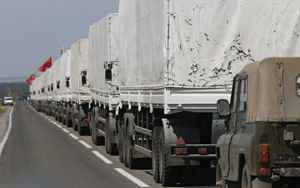(Finance) – Italians are worried about the conflict Russian-Ukrainian linked to the fear of a new cold war, and the use of chemical and atomic weapons. Without forgetting the negative consequences on the national economy. These are the main evidences that emerge from the survey carried out in recent days as part of the “Observatory” project, promoted by AreaStudi Legacoop And Ipsos.
94% of Italians are very or quite worried about the conflict in progress; the average percentage of those who feel a greater fear (50%), rises significantly between the under 30s (62%) and the lower-middle class (58%). Among the elements that arouse greater concern is the possibility of a second cold war (83%), damage to central nuclear Ukrainian (81%), the risk that some party in the conflict will lose control and use chemical or atomic weapons (80%). Over half of our population (55%) is afraid reprisals missile Russians against Italy and a third of having to send Italian soldiers to fight.
This concern of a general nature is accompanied, in the same tone, by that for impact direct on the Italian economy, declared by 95%. In 53% of those who say they are very worried, the popular class (66%), women (63%) and the noon (60%). It is feared, above all, that the conflict could lead to a generalized increase in prices (66%), to a reduction in gas supplies (56%), to an increase in the prices of wheat derivatives (pasta, flours, breads and products bread-making; 36%). In general, more than one in three Italians fear an explosion in inflation or significant losses due to cuts in exports (36%). In line with these fears, Italian families are trying to to save money and to reduce the consumption (37%, but 45% of young people and 44% of the working class), fear losses of purchase power (31%) and loss of value of their savings (28%), to the point that 9% plan to withdraw them from the bank (even 17% in the working class).
“This war so close to us is unjustifiable and inconceivable – he commented Mauro Lusetti, president of Legacoop – for months we have talked about the new normal and never would have thought that a new war would emerge from uncertainty. This bewilderment is shared by all Italians and Italians, in an even more radical way than we imagined. Our country demonstrates not only that it is for peace, against war and against arms, but also a great awareness of the complex issues at stake. We feel a strong closeness to the populations involved, and the active commitment in our communities in these days proves it. Furthermore, the direct consequences of this conflict on Italy are evident: it risks being a bomb thrown against the machinery of economic recovery. The sentiment of our country is evident: after the pandemic the world must restart with peace, not with war ”.
But what does it mean to commit concretely to re-establish the peace? The Italians are asking for a step back from all the parties involved: to Ukraine the recognition of the autonomy of the Donbass as required by the Minsk agreements (81%); to Russia the withdrawal of its military forces from Ukrainian territory (81%); international institutions to favor negotiations for a security that guarantees both the EU and the Russian Federation (78%). Above all, however, there is a strong demand (89%) for a humanitarian corridor that allows international agencies and NGOs to guarantee support at the population.
The Italians are for peace and opposed to resorting to weapons. A very large majority (88%) argue that “no military support should be given to the war”; similarly (90%) that the US should withdraw nuclear weapons from NATO countries and Russia should do the same with the countries bordering Europe. Furthermore, for 87%, all states are expected to end nuclear weapons modernization programs.
What should Italy do directly to restore peace? Limit yourself to interventions humanitarians for 54% of the population, ad actions diplomatic and economic against Russia for 44% (but 53% among the under 30, 50% among men), the blockade of the assets of the oligarchs and banking exchanges for 39%. Only for 19% of Italy must contribute to the supply of armaments to the Ukrainian “resistance”.
